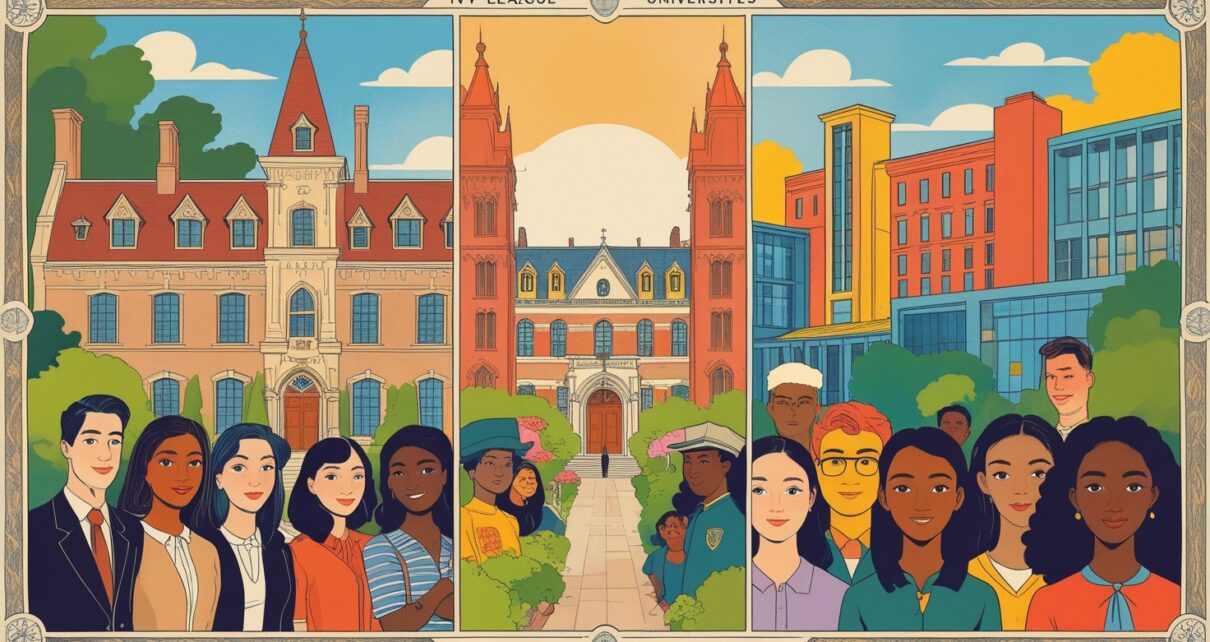When thinking about studying in the United States, one big question comes up for many international students: Should I choose an Ivy League school or a public university?
Both offer great opportunities, but they are quite different. Understanding these differences can help you make the right choice for your future. Whether you dream of Harvard or hope to explore a large public campus, this guide will help you decide what’s best for your journey.
What Are Ivy League Schools?
The Ivy League is a group of eight private universities in the United States. These include Harvard, Yale, Princeton, Columbia, Brown, Dartmouth, University of Pennsylvania, and Cornell. They are known around the world for their academic excellence, history, and reputation.
These schools are very selective. Getting admitted is challenging, and the application process is intense. However, many students still apply because of the prestige, strong alumni networks, and career advantages that come with an Ivy League degree.
What Are Public Universities?
Public universities are funded by the state government. Examples include the University of California system (like UCLA and UC Berkeley), University of Michigan, University of Texas, and many others across the country.
Public universities offer a wide range of programs and are often much larger in size compared to Ivy League schools. They have students from diverse backgrounds and usually provide more affordable education options, especially for in-state students. International students may pay more, but it still might be cheaper than Ivy League tuition.
The Key Differences
Here’s a closer look at how Ivy League schools and public universities differ:
1. Tuition and Cost
Ivy League colleges are private, which means they charge high tuition fees. The cost of attendance can go up to $80,000 per year, including housing, meals, and other expenses. However, they offer strong financial aid for students who qualify.
Public universities are usually more affordable, even for international students. Some even offer scholarships to help lower the total cost. If managing your budget is a top concern, public universities might be a better fit.
2. Admissions Process
Ivy League schools look at more than just grades. They consider your personal story, leadership skills, essays, and recommendations. Many international students find this stressful, especially if they are unfamiliar with the system.
Public universities are usually more focused on your academic record. Some have automatic admission policies for students who meet certain grade or test score requirements. This makes it easier for some students to plan ahead.
3. Campus Life
Ivy League campuses are often smaller, with a close-knit community feel. Classes are usually small, and students can build strong relationships with professors. There’s a strong sense of tradition and identity at each Ivy League school.
Public universities have a more energetic and diverse environment. Campuses are larger, with more clubs, events, and activities. You’ll meet people from many backgrounds, which can be a wonderful part of your international experience.
4. Career Opportunities
Ivy League schools have powerful alumni networks. Graduates often get top internships, jobs at major companies, and are accepted into prestigious graduate programs. The name recognition of an Ivy League degree can open doors around the world.
Public universities also offer excellent career services, and many have strong links with industries in their regions. For example, schools in California are connected with the tech industry, while those in New York may offer more finance and media opportunities.
5. Cultural Experience
Studying at any U.S. university gives you exposure to a new culture, different perspectives, and academic freedom. Ivy League schools might offer a more traditional academic culture, while public universities give a broader, more dynamic view of American life.
If your goal is to make local friends, attend large events, and explore more of everyday American culture, a public university might be the right place. If you want a focused, intensive academic setting with deep traditions, the Ivy League might feel like home.
What Should International Students Consider?
Choosing between an Ivy League and a public university can feel overwhelming. Think about these questions:
- What can I afford?
- What kind of support do I need as a student far from home?
- Do I want a large school with many activities or a smaller one with personal attention?
- What are my career goals after graduation?
Remember, success doesn’t only come from the name of the school. It comes from your hard work, your mindset, and how you use the opportunities you get.
Conclusion
There is no “better” choice between Ivy League schools and public universities—only what’s better for you. Both options can help you achieve your dreams and build a strong future.
If you’re still deciding where to apply for your study abroad in USA plan, explore all your options, compare what each school offers, and listen to your own goals.
For more helpful guides and answers to your questions as an international student, keep following Stubard. We’re here to support you every step of the way.




